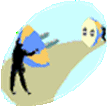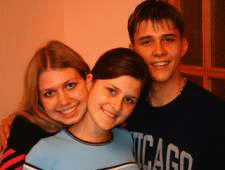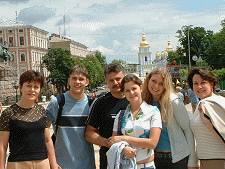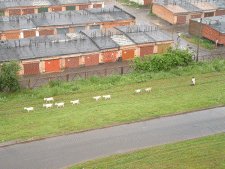
Last
month I took a 12-day vacation -- the longest time I have ever been
away from my office in the 9 years that I've been in business. For as
long as I can remember, I have not taken more than one week away at
a time. And in early August I will be gone another 13 days for a trip
to Australia, where I will provide a workshop and some consulting, mixed
with family vacation.
So
why the change in vacation habits? I've decided that I need more time
off. I’ve been working too hard. Perhaps part of this revelation
is due to the fact that our daughter will be a senior in high school,
and this is her last year at home before she moves away to college.
Unlike some parents of teens, I am dreading her departure and am treasuring
my time with her now. I am fortunate to be blessed with a wonderful
daughter that I love spending time with!
The
desire to take more time away from work means organizing my business
differently. I’ve been setting up more automated systems and enlisting
the help of others. I finally hired an assistant, which has caused me
to reassess how I spend my time. Initially, there was more work involved
in delegating than if I had just done the work myself … but that
is a short-term view of a long-term issue. Yes, it took me hours to
create a Procedures Manual that documents what needs to be done and
how I want it done. But now that I have taken the knowledge from my
head and committed it to paper, it is so much easier to delegate!
Has
it been easy? Nope! Has it been worth it? Yup! I had such peace of mind
going to Europe last month without closing my business do to so. The
rewards of owning and running a business AND having a life have made
it all worth the investment of time to delegate what someone else can
do!
Unlike
our previous two summer vacations (mission trips to Mexico -- see Making
a Difference), last month we went to Ukraine to visit our exchange
student who lived with us a year ago. Olha’s family invited us to
be their guests for a week, and we readily accepted the invitation. Since
we flew through Amsterdam both ways, we also visited Holland (the Paauw
family is of Dutch ancestry) for a few days on our way back home.
We
felt very fortunate to experience life in Ukraine with such a wonderful
host family during our stay. We spent four nights in Olha’s family
home in Poltava -- about a four hour drive from Kiev -- and two nights
in Kiev.
 Our
daughter (Carly) with Olha and Oleg
Our
daughter (Carly) with Olha and Oleg
|
 Olha
with mom, brother, dad, Carly & me in Kiev
Olha
with mom, brother, dad, Carly & me in Kiev |
I’ll
share some of my impressions here.
Housing:
Their
homes are much smaller than ours. As a result, Ukrainians are very resourceful
in their use of space. The rooms in Olha’s family flat were multi-purpose
– a family room and an office by day became sleeping rooms at
night. All of the rooms had a futon-like couch that made into a very
comfortable bed each night. Clothing and personal items were cleverly
concealed in furniture in each room. Unlike many American homes, Ukrainians
tend to buy only what they need or highly value, and they don’t
waste money or space storing items that will not enhance their lives
in some way.
Economy:
The cost-of-living is much lower, but so is the average salary. We learned
how poorly teachers are paid. Olha’s friend’s mother currently
works at a McDonald's (yes, the fast food
giant) in England, where she
is paid much better than she was paid as a teacher in Ukraine. She is
able to send some money back to her family in Poltava to help support
them, but she does not get to see her husband and kids more than once
or twice a year.
Communications:
Olha’s family pays as much for their monthly phone bill as they
do for their monthly mortgage payment for their 3-room flat. We discovered
that many people own cell phones. The Internet is very expensive for
people to use in Ukraine, as dial-up minutes must be purchased on calling
cards, in addition to paying a per-minute cost for using the phone line.
No high-speed connection is available, so sending and receiving messages
can be quite slow and expensive.
Health:
Most of the Ukrainian people are thin or of average weight. Although
they eat lots of carbs (bread, potatoes, and other starchy foods), they
eat smaller portions. They also walk a lot. According to our pedometer,
we walked an average of 10 miles per day during our visit. Restaurants
were not very popular in the town of Poltava. There were no fast food
restaurants there, although we saw several McDonald’s in Kiev.
Unlike in the US, food does not seem to be as much of a central focus
for entertainment. (Alcoholic beverages are a different story!)
Education:
We asked Olha and her brother, Oleg, to compare their educational experience
in Poltava to the schools they attended for a year in the US, since
both of them have been exchange students for a year. They agreed that
education is better in Ukraine than in the US. Doing well in school
is very important, as grades and aptitude tests determine whether or
not you will continue on to college or go into trade school. Higher
education becomes a very competitive privilege to receive.
Language:
Ukrainian and Russian are the languages spoken by most. In Poltava,
very few people spoke English. In Kiev we found a few more people who
spoke English, but it was still not very common. Olha and her brother
speak English very well, and their parents spoke and understood a little.
It would have been difficult for us to get around, had we not had Olha
and Oleg to translate for us. Everything was in Russian – street
and store signs, menus, etc. Even finding our way out of the airport
would have been a challenge without a translator.
The
impressions I walked away with are generalizations, and I recognize that
they do not apply to all Americans or to all Ukrainians, although they
apply to many...
Americans
buy way too much stuff! When we fill our homes with too much,
we buy a larger home to contain more stuff, or we rent a storage unit.
Ukrainians seem content with what they have. They have enough room and
enough possessions to live comfortably, but not extravagantly. They
use their space very wisely.
Americans
overeat, and food is a central part of our entertainment. The American
population has weight-related illnesses as a result, such as diabetes
and heart disease. Ukrainians enjoy their food, but not to excess.
Americans
rely too much on cars to get around and don't get enough exercise.
(This may possibly relate more specifically to living in the Seattle
area, where public transportation is not very good.) In Ukraine we relied
on public transportation and we walked a lot. We got a lot more exercise!
Americans
spend too much time with electronic equipment. We don’t tend
to interact with people as much, because we interact with so many electronic
gizmos – email, computers, electronic games, etc. Ukrainians limit
their contact with electronics, and they invest more time interacting
with each other.
All
of us learned something from experiencing the Ukrainian culture and way
of life. Perhaps the best way to summarize what we learned is to share
an excerpt from my 17-year-old daughter’s journal (shared with her
permission).
When
we arrived in Kiev and pulled into Olha’s home, I was shocked
to see the peeling paint on the side of the building that they lived
in -- referred to as a flat. The roads nearby were gravel, and there
was a field of rusty storage garages adjacent to the flat. They lived
on the eighth floor of the flat and we had to take our luggage up in
the world’s most unreliable elevator. It was about a third the
size of a small car and broke down several times a day.

Goats and
goat herder in front of the rusty storage garages
Upon
entering the flat, I was a little surprised. During the entire time
that Olha lived with our family, I had never once thought about how
wealthy Olha’s family was. I had also never thought about how
different Ukraine’s style of living would be. I guess I had just
expected that Olha lived in a similar house to ours because she seemed
so adjusted to life in the US. What I didn’t realize with this
mindset was that people from different countries tend to adjust to whatever
they have. To them, life isn’t measured by how many things they
have, but by the quality of their interactions with people and everyday
events. That’s the way that life should be. On this trip, I realized
that America is so full of want and desire for superficial things and
social status, but in Ukraine everything that went on had such substance
that I got a gratifying feeling just seeing the happiness in simplicity.
The
flat was small, very small -- one level -- 3 bedrooms, one bathroom,
and one small kitchen. Each room had a futon that turned into a bed.
Olha’s room had the TV, so the family basically used it as their
living room. What struck me about Olha’s family on that first
night was how kind and hospitable they were. They gladly gave up their
rooms to make room for us with our thousands of pounds of luggage. We
really stuck out. Each of us had a huge amount of things that we had
brought with us. There was no reason for us to have brought so much;
we never even touched most of it during our entire trip.
Looking
around their flat on the last day, I realized how much I wanted Olha’s
life. The small, cute home that their family shared felt so much more
personal than most American homes. In each room, I could imagine the
family crowding around a simple board game or book and sharing laughs
and memories together. I could see them cherishing everything in their
homey surroundings because they knew that everything around them was
a well-loved item that they were proud of and knew they had earned through
hours of hard work.
I
appreciate everything I have, but sometimes I just wish that I didn’t
have it. I love the internet as much as the next person, but I feel
like relationships and the connection that people in Ukraine have to
each other are much stronger because of their lack of technology. I
want that simple life. I want to live in a house with virtually no internet
connection, so I can learn how to spend my time in more gratifying ways
and become a deeper person. I want to take the bus everywhere and walk
for hours on end along the dusty roads, looking at everything that the
daily pieces of life have to offer, past the bustling marketplaces and
reluctant goats. Everything in Ukraine is personal, every place tells
a story, and every person that you pass has a feeling about them, whether
it is happy, painful, sad, etc. No one is fake or demanding—what
you see is what you get. Rubber time is a way of life. No one gets bent
out of shape or uptight about stupid things. Nothing is industrialized.
It is not a fake, robotic, metallic world, like ours. It is real and
human and refreshing.
It’s
amazing how much a trip like this can change me. Living in a home with
someone in a foreign country is a much richer experience than living
in a hotel there. I learned so many things from Olha’s family
and their way of living. They made me want to be a better person. Of
course I will still have my obsessive spending problems, but I am learning
how to save more and how to savor all that I have in my life. When I
got home I immediately went through all of my possessions and gave away
about half of everything I had. It made me feel so much better and so
much lighter. I don’t need all the things I have; I don’t
even want some of them, so why have them?
As
I read my daughter's journal entries from the trip, it reminded me of
this quote from Lynne Twist:
"If
we let go of what we're trying to get more of, which we really don't
need, it frees up reserves of vitality to make a difference with what
we have. When you make a difference with what you have, it expands.
This applies to love, to time, to relationships -- and, of course, to
money. If you sit down and make a difference with the money that you
have, you will find that your experience of it expands, and you don't
have that focus on scrambling to get more of what you don't really need
-- which is what most of us are so busy doing that we don't even notice
who we are and what we have. By contrast, the context of sufficiency
is making a difference with who you are, what you have, and knowing
that it's whole, complete, and exactly enough. It's perfection."
Jeffrey
E. Young and Janet Klasko, authors of Reinventing
your Life, suggest that we let go of our need for perfect order, achievement
or status in exchange for a higher quality of life and more fulfilling
emotional relationships with the people we love.

| 
|
Kathy's
upcoming
teleconference
offerings in August
Teleclasses are live, interactive
training classes conducted over the telephone, using a telephone
"bridge" line -- a telephone line that allows groups
of 2 or more people to be on the line at the same time. You
can call from the comfort of your home or office while eliminating
travel time and expenses. |

Buried
in Paper?
Learn
a simple 3 step process to help you
eliminate paper pile-up forever.
What
are your piles of paper costing you? Peace of mind? Missed opportunities?
Late payment fees? Time to do what you care about most? This teleclass
will teach you how to handle mail and other paper as it comes into
your home or office. You'll learn a system that will remind you
of important follow-up.
Click
here for more information on this FREE teleclass.

|
Our
mission…
is to help you de-clutter your schedule, space, and mind
so you can focus on what’s most important to you!
Table of Contents for Past Issues
Products
| Paauwer
Tools is a free monthly newsletter.
To
subscribe to this newsletter click here.
We
appreciate your forwarding this to your friends and colleagues you
think might benefit from reading it. Your recommendation is how
we grow. Anyone can subscribe. We request that you keep the broadcast
intact, including the contact and copyright information.
You
are free to use the material from my articles in whole or in part
on your web site or ezine (email newsletter) as long as you include
the attribution below and also let me know where the article will
appear.
| This article
is by Kathy Paauw of Paauwerfully Organized. Kathy's web
site is a comprehensive resource devoted to helping busy
professionals and small business owners de-clutter their
schedules, spaces, and minds so they can focus on what's
most important. Kathy is an organizing & productivity
consultant, certified business & personal coach, and
speaker. Contact her at kathy@orgcoach.net.
For free resources and valuable productivity
tools visit http://www.orgcoach.net. |
E-mail
your comments, questions, and suggestions for future newsletter
content to me. I'd love to hear your thoughts!
Warm
regards,
Kathy Paauw,
Paauwerfully Organized
425-881-6627
kathy@orgcoach.net |

Copyright
© 2004 Kathy Paauw, All Rights Reserved. |

